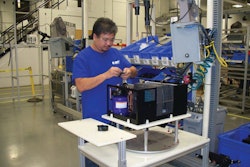Scania is now taking a further step in its efforts to reduce the climate impact from its own operations. Using renewable bioethanol as a fuel rather than fossil-based diesel will help reduce the climate impact of carbon dioxide emissions from Scania’s own goods transport services at its production facilities in Södertälje, Sweden, by approximately 70%. The eight ethanol trucks that are now being put into operation will contribute to a decrease in CO2 emissions equal to that of 12 normal homes heated by fossil-based electrical energy.
“As a supplier of transport solutions, it is important for us to take the lead in developing sustainable alternative solutions and demonstrate how sustainability and efficiency are linked in practice,” says Anders Nielsen, Scania’s Head of Production and Logistics.
Scania currently offers a series of climate- and energy-efficient products and services – Ecolution by Scania – that helps transport companies reduce their carbon dioxide emissions and maximize revenue from their truck and bus operations. Ecolution by Scania is a comprehensive solution including optimised vehicles, driver training and continuous monitoring of both vehicles and drivers. In distribution services, switching to vehicles that run on biofuels will lead to a substantial reduction in climate impact.
In Södertälje, Scania primarily operates trucks to transport components and packaging material between its various production and assembly workshops. These internal freight traffic operations were recently taken over by the Scania Transport Laboratory, a wholly-owned subsidiary that tests and evaluates vehicle characteristics and performance in commercial haulage. Its task also includes developing and monitoring Scania’s drivers with regard to economic and safe driving.
“By switching to ethanol, Scania is demonstrating that sustainable solutions can be achieved – here and now – with technology that is already available today,” says Anders Nielsen.
To help increase the availability of renewable fuels for commercial vehicles, Scania will open a public filling station in Södertälje later this year with fuel dispensers for RME (rapeseed methyl ester), ED95 (ethanol) and biogas.



















